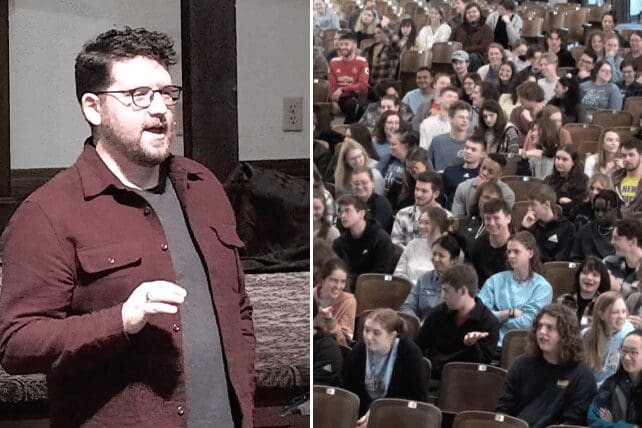What does it feel like to preach a sermon that sparks a weeks-long spiritual awakening filled with prayer, singing, and repentance, and which garners national attention and sparks hope in the hearts of Christians around the country?
For Zach Meerkreebs, it actually didn’t feel that great. In fact, he thought the sermon had bombed.
“Latest stinker. I’ll be home soon,” Meerkreebs reportedly texted his wife after delivering a chapel sermon on the morning of Wednesday, Feb. 8, in the Hughes Auditorium of Asbury University in Wilmore, Kentucky.
Meerkreebs later told The Free Press he was certain that he had “totally whiffed” the sermon.
A graduate of Asbury Theological Seminary, Meerkbreebs is a former pastor who currently works for Envision, a Christian and Missionary Alliance ministry aimed at developing missional leaders. He also serves as assistant coach for the Asbury men’s soccer team.
RELATED: What Is Happening at Asbury University Wasn’t Planned—Is This the Start of Widespread Revival?
In many ways, the chapel service was quite ordinary. Following announcements, among which was an upcoming Mario Kart esports tournament, students led a Scripture reading and a set of worship songs, after which university pastor Greg Haseloff offered a prayer for those affected by the devastating earthquake in Türkiye and Syria, which had occurred two days earlier.
Meerkreebs then took the stage to continue a teaching series titled “Love in Action.”
To start the sermon, Meerkreebs joked that he was thankful to the tech team for not unmuting his microphone during the worship music, lest students be treated to the sound of “someone stepping on a dog.”
Explaining that his sermon would center on a text in Romans 12, Meerkreebs said, “That’s the star: God’s word, Jesus, and the Holy Spirit moving in our midst. That’s what we’re hoping…I hope you guys forget me, but [that] anything from the Holy Spirit and God’s word would find fertile ground in your hearts and produce fruit.”
During the sermon, Meerkreebs spoke about the call of Christians to “love without hypocrisy,” pointing out the ways in which he and others have experienced a kind of “love” that has fallen short, sometimes even resulting in abuse.
“If you have experienced that kind of ‘love,’ there [are] leaders on campus that will stay in these seats and pray with you,” Meerkreebs encouraged. “If you need to hear the voice of God, the Father in heaven who will never love you that way, who is perfect in love, gentle and kind, you come up here and experience his love.”
“Don’t waste this opportunity,” Meerkreebs continued, pausing his sermon to offer a prayer for the people in the room who “feel the weight of that perverted thing that one person called ‘love,’” asking that God would “alleviate that weight right now.”
Going on to urge students to cultivate a non-hypocritical love toward others, Meerkreebs conceded, “It’s humbling. It’s inconvenient. It’s sacrificial love.”
“But by being transformed by Jesus, getting his affections, we would see ourselves as servants—it’s a call on our lives,” Meerkreebs said. “You cannot love until you are loved by Jesus.”
“Stop striving. Stop wearing this heavy burden of ‘I gotta love, because I’m a Christian,’” Meerkreebs went on to say. “No, you gotta love because you’ve tasted and seen the goodness of God…You have been loved. You have to continue to put yourself before Jesus so you can be loved by him so you can love others.”

